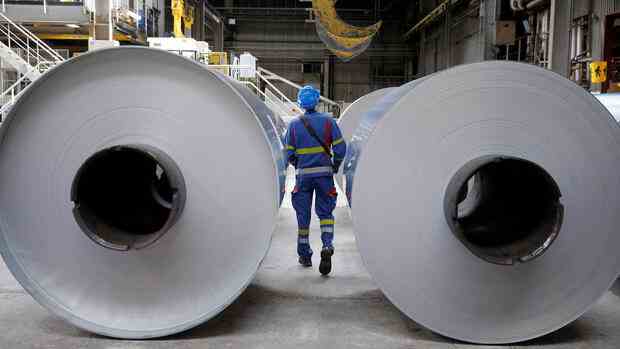It has not yet been clarified how the export of metals to the world market will continue to be worthwhile.
(Photo: REUTERS)
Brussels In the future, the EU will levy taxes on energy-intensive goods imported from third countries. The institutions of the EU agreed on this early Tuesday morning. The levy is intended to compensate for the competitive disadvantage that arises when European companies have to pay a CO2 price but foreign companies do not.
“This is a historic agreement,” said Pascal Canfin, Chair of the Environment Committee in the European Parliament. “We’ve been talking about it for at least two decades, now it’s becoming a reality.” The mechanism will be unique in the world.
The carbon border adjustment mechanism, known in technical terms as “Cbam” (“Carbon Border Adjustment Mechanism”), is an important element in the plan to reduce CO2 emissions in the EU by at least 55 percent by 2030 compared to 2005 levels.
The border adjustment is necessary due to the reform of emissions trading, which will be completed this weekend. This reform will eliminate some free allocations of emission allowances. This means that prices for energy-intensive goods produced in the EU are rising will. To ensure that production in Europe continues to be worthwhile, the levy will also increase the prices for imported goods. Imports are to become more expensive to the same extent that the price of CO2 makes goods from EU companies more expensive.
Top jobs of the day
Find the best jobs now and
be notified by email.
It was unclear until the very end which goods were affected. The negotiating parties have now agreed on iron and steel, cement, aluminum, fertilizer, electricity and hydrogen. The border adjustment is to take effect after a three-year transition phase in 2026. Until then, procedures and IT systems must be set up to record the CO2 footprint of imported goods.
EU companies could become less competitive
In theory, the border adjustment creates a fair market in which European and non-European suppliers pay the same prices for the CO2 emissions of the goods they offer on the EU market. However, in practice there are two problems:
- Firstly, preliminary products cannot be comprehensively taken into account. This plays a role in food production, for example: Fertilizers will become more expensive in the EU, which means that the prices for food produced in the EU will also rise. However, the price of imported groceries remains stable. This could be to the detriment of some European farmers.
- Secondly, the loss of free allocations makes exports by European companies more expensive, making them less competitive on the world market. This will be relevant for the manufacturers of aluminum and steel. Whether these products can continue to benefit from free carbon credits as long as they are earmarked for export remains to be seen. A decision on this could be made at the weekend when the final negotiations on the emissions trading reform are to be held.
The metal industry takes a critical view of the outcome of the negotiations. “The competitiveness of production in Europe is weakened,” said Michael Niese, Managing Director of the Metal Trade Association. “The prices for materials in Europe will increase compared to the world market. The exports of the basic industry will be burdened.” Rolled and pressed products made of aluminum are particularly affected.
For the steel industry, the issue of free allocation of emission allowances for exported goods is particularly relevant.
(Photo: dpa)
There is no alternative to free allocation for exports, said Hans Jürgen Kerkhoff, President of the Steel Industry Association. “Otherwise, 20 percent of steel production in Germany would be threatened.”
Hydrogen and ammonia are not exported from the EU in relevant quantities, which is why the loss of free allocations is less risky for them.
>> Read here: When is hydrogen “green”? EU Commission accommodates economy on central issue
Other chemicals and plastics are not included for the time being. You can still get free CO2 certificates. However, it is planned to extend the border adjustment to other products once it has proven itself.
The chemical industry sees no scope for this. “When it is introduced, the EU must take a close look at whether and how the system works,” said VCI Managing Director Wolfgang Große Entrup. “There is a great danger that European chemical production will continue to lose competitiveness compared to the USA, but also to the Gulf States or China.”
More: Under decarbonization pressure – The steel industry must quickly become carbon neutral
